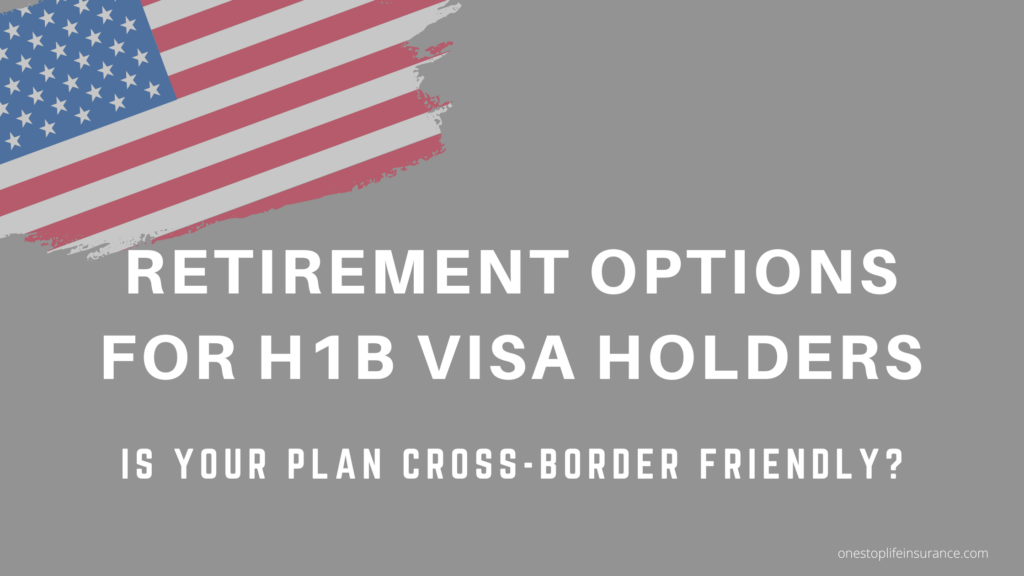What Are the Best Retirement Options for H1B Visa Holders?
What happens if you leave the U.S.? Are your savings safe from taxes? How can you prepare for an uncertain future?
With the added complexities of cross-country tax, portablity, and visa restrictions, this guide covers retirement options for H1B visa holders, including 401K rules, IRA strategies and how life insurance can play a role in your retirement.
In this guide, we’ll outline the best retirement options for H1B visa holders, strategies for minimizing taxes, and how life insurance can enhance your financial security. We are working with foreign nationals to plan for their future and we’ve helped hundreds of H1B visa holders to create a comprehensive plan.
What we will cover:
- What are the key challanges visa holders face
- Retirement Options for H1B Visa Holders: Quick View
- 3 Mistakes H1B Visa Holders Make When Planning for Retirement
- Leaving the US? What Happens to Your 401(k)?
- What other options do visa holders have when planning for retirement?
Quick Summary of Key Challenges for H1B Visa Holders Planning Retirement
Having worked with hundreds of H1B visa holders and their families, we’ve noticed common trends. Many are maximizing their 401(k)s, HSAs, and contributing to Roth IRAs. While these are great options, they come with unique challenges for visa holders, including:
- Dual taxation
- Portability of the plan
- Accessibility of the plan
- Minimizing market risk
In this article, we’ll review retirement options, dive into these key challenges, and explore a strategy that complements a diversified portfolio.
Not sure if your retirement savings are secure? Review your options as a visa holder in the US.
Retirement Options for H1B Visa Holders: Quick View
Let’s explore some common retirement vehicles visa holders use and their pros and cons:
1. 401(k) Plans
Pros:
- Simplicity: These employer-sponsored plans are easy to set up, with contributions deducted directly from your paycheck.
- Employer Matching: Some employers match your contributions up to a certain limit – essentially free money you should take advantage of.
- Tax Benefits: Contributions are tax-deductible, giving you a “break” on your taxes now.
Limitations:
- Early Withdrawal Penalties: You’ll face penalties if you access funds before age 59 ½.
- Future Tax Consequences: While you get tax benefits now, withdrawals in retirement are taxed, and future tax rates are uncertain.
- Portability Risks: Some plans are not as portable as you might think. Major providers may freeze or close accounts if you leave the U.S. For example, Wells Fargo announced in 2021 that it would freeze accounts for non-resident holders.
2. IRAs (Traditional vs. Roth)
IRAs are popular for retirement planning, with two primary types: traditional and Roth. The key difference? When taxes are paid.
- Traditional IRA: Taxes are deferred until withdrawal.
- Roth IRA: Contributions are made with after-tax dollars, but growth and withdrawals are tax-free.
Limitations for H1B Visa Holders:
- Income Limits: Roth IRAs have strict income thresholds, making them less accessible for high earners.
- Portability Issues: Like 401(k)s, IRAs may face restrictions or closures if you move abroad.
- Market Risk: These accounts are tied to market performance, exposing you to potential losses, especially if forced to liquidate early.
3. Other Savings Options
Additional vehicles include SEP IRAs, HSAs, and taxable brokerage accounts. While these can provide diversification, they come with their own set of risks and limitations, especially for visa holders.
Other Benefits, Such as Social Security Retirement Benefits
Counting on Social Security as a visa holder can be challenging. Even if you qualify by meeting specific requirements, benefits may not be accessible if you live outside the U.S. for more than six months.
Additionally, work years in the U.S. may not be recognized by your country of origin, complicating your eligibility for retirement benefits there.
3 Mistakes H1B Visa Holders Make When Planning for Retirement: Why 401(k) Might Not Be Enough
In the following part, we will go over some of the most common mistakes that we’ve encountered when talking with clients.
1. Over-reliance on employer-sponsored 401(k) plans without understanding tax implications
This is probably one of the most common mistakes we see. Many of the clients we talk to are not aware of the various plans available and rely heavily on 401(k) plans without considering their drawbacks.
We understand. Considering that employers offer matching contributions and that they are easy to set up, it is no wonder they are one of the most popular financial tools to invest in for retirement. However, there are some drawbacks. One of the biggest limitations is the tax deferral. We do not know what the tax rates will look like 10, 20, or even 30 years from now. Essentially, we are growing our retirement nest egg without knowing how much we will have to share with the government.
2. Failing to consider international portability when planning for potential relocation
This ties back to the first mistake. What happens to the funds in your account should you move back to your country of origin? Can you access them or transfer them? Will there be any penalties or tax implications? Cross-border financial planning is of a high importantce for visa holders.
While many of our clients intend to remain in the US, there is the risk of leaving the country, sometimes on fairly short notice. Many are not aware of what happens to retirement accounts upon leaving the US.
In fact, some major providers have announced that they will no longer service retirement accounts if the account holder does not live in the US. The accounts can be frozen or even closed. This could be financially devastating, as there might be penalties for early liquidation and tax implications.
3. Neglecting tax-advantaged tools like Roth IRAs or life insurance for diversification
There are other diversification vehicles that you can contribute to with after-tax dollars and access the growth in the future, income tax-free. To achieve maximum potential and growth, there needs to be a balance between all accounts.
Some of these accounts are well known, such as Roth IRAs. However, there is another vehicle that can provide you with income-tax-free retirement: life insurance.
Properly designed life insurance can help not only protect you against tax risk, but it is also portable and market-protected.
When it comes to retirement options for H1B visa holders, the question becomes: Is your retiment plann cross-border friendly and tax-efficient? Click here to see your options and secure your future.
Leaving the US? What Happens to Your 401(k)?
If you decide to leave the US for one reason or another, several things may happen to your accounts.
As we mentioned above, many providers may decide to freeze or even close your retirement accounts when you notify them of leaving the country. Many individuals are unaware that their 401(k) accounts could be closed or restricted within months of leaving the US.
This issue stems from the policies of certain US financial institutions. Companies like Wells Fargo, UBS, and Merrill Lynch have been known to freeze or close accounts for clients who no longer reside in the United States. These institutions often find it simpler to stop serving non-resident account holders than navigate the complex regulatory environment of managing international accounts.
Imagine this scenario:
- You move abroad – perhaps because your visa wasn’t renewed or for a new opportunity.
- You notify your 401(k) provider about your change in residency.
- Shortly after, you receive a letter giving you 90 days to act.
You’re typically given three options:
- Roll over your funds to another retirement account.
- Convert your account to a different financial product.
- Withdraw your savings entirely.
If you don’t take action, the provider may liquidate your account, deduct applicable penalties, and mail you a check for the remaining balance.
One of the most significant risks is that liquidating your 401(k) could trigger a taxable event. If your account balance has grown beyond your contributions, you’ll owe taxes on the gains. Depending on the tax laws in your new country of residence, you might also face additional taxation, resulting in a significant loss of your savings.

What other options do visa holders have when planning for retirement?
There is an additional option that solves the risk for portability, accessibility, tax, and market exposure for visa holders. It is LIRP: Life Insurance Retiment Planning. We will cover in greater detail in Part 2 of this article. However, properly designed life insurance can provide you with predictable growth, tax advantages, and portability across borders.
Unlike traditional accounts, LIRPs are portable across borders, allowing H1B visa holders to secure tax-advantaged retirement savings no matter where life takes them
| Retirement Option | Pros | Cons | Tax Implications |
|---|---|---|---|
| 401(k) Plans | – Easy to set up through employers – Employer matching provides “free money” – Tax-deductible contributions | – Penalties for early withdrawals – Uncertain future tax rates – Portability issues if leaving the U.S. | – Contributions are tax-deferred – Withdrawals in retirement are taxed as ordinary income |
| Traditional IRA | – Tax-deferred growth | – Early withdrawal penalties – Portability challenges for visa holders – Market risk exposure | – Contributions may be tax-deductible based on income – Withdrawals in retirement are taxed as ordinary income |
| Roth IRA | – Tax-free growth and withdrawals – No required minimum distributions | – Income limits for eligibility – Contribution caps – Portability concerns for international relocation | – Contributions made with after-tax dollars – No taxes on qualified withdrawals |
| Taxable Brokerage Accounts | – No contribution limits – Flexibility to withdraw funds anytime | – Subject to market risks – Gains are taxable – No tax-deferred growth | – Capital gains taxed at short- or long-term rates – Dividends taxed as income or at qualified rates |
| Life Insurance (LIRP) | – Predictable growth – Tax-free access to funds via loans – Portability across borders – Market-protected growth | – Requires proper design to maximize benefits – May require health underwriting – Premiums can be higher than other options | – Contributions are made with after-tax dollars – Growth and withdrawals (via loans) are tax-free if structured properly |
Summary:
- 401(k)s and IRAs are excellent for those planning to stay in the U.S. but face significant challenges for those leaving the country.
- Brokerage accounts provide flexibility but lack tax benefits.
- Life insurance (LIRPs) stands out for visa holders due to its portability, tax advantages, and protection from market risks.
Key Takeaway:
Visa holders face unique risks in retirement planning, from portability issues to tax uncertainties. It’s essential to evaluate all your options to avoid costly mistakes.
We specialize in helping H1B visa holders build tax-efficient, portable retirement plans. Request a free consultation or insurance quote today and secure your financial future – no matter where life takes you.
